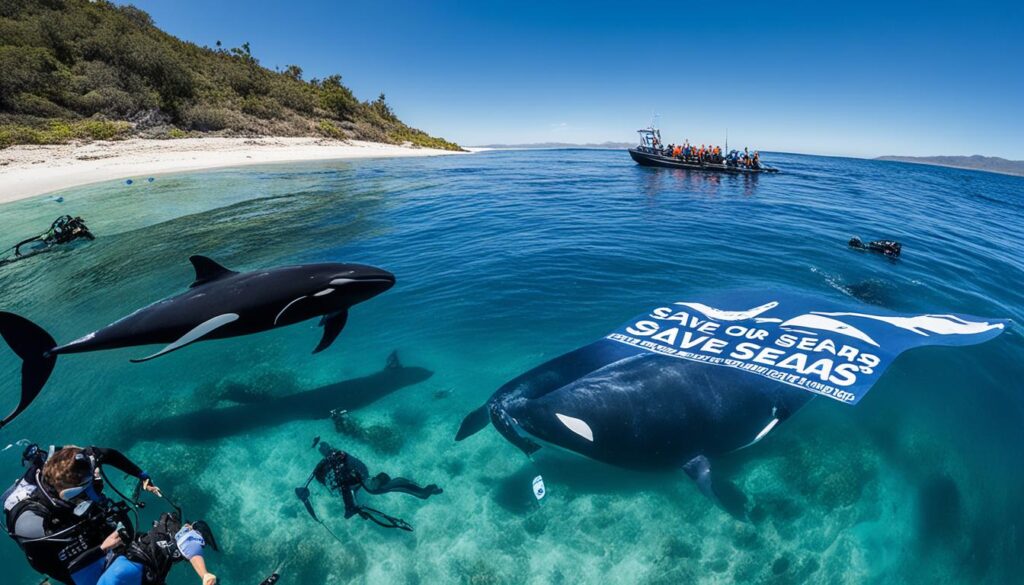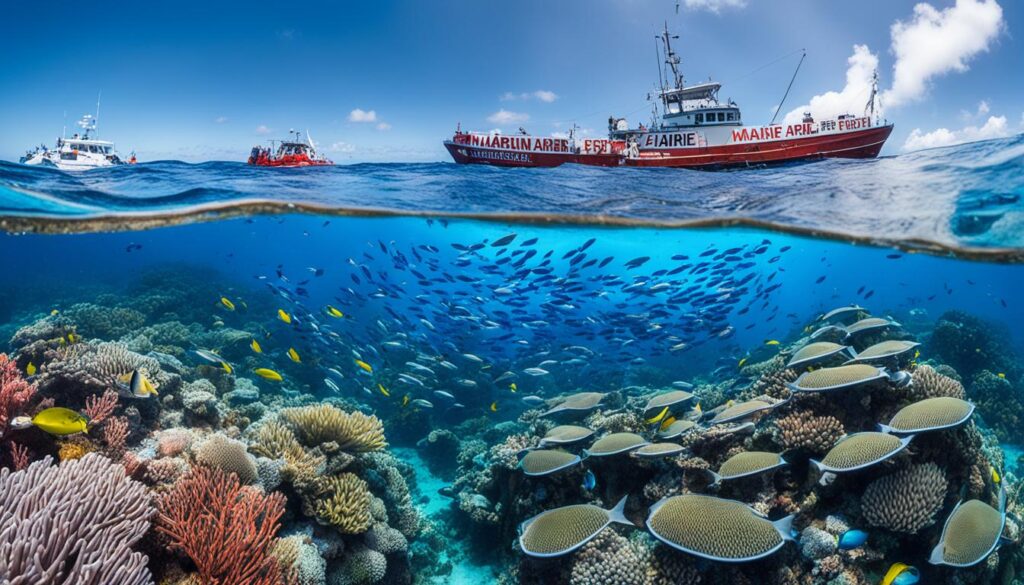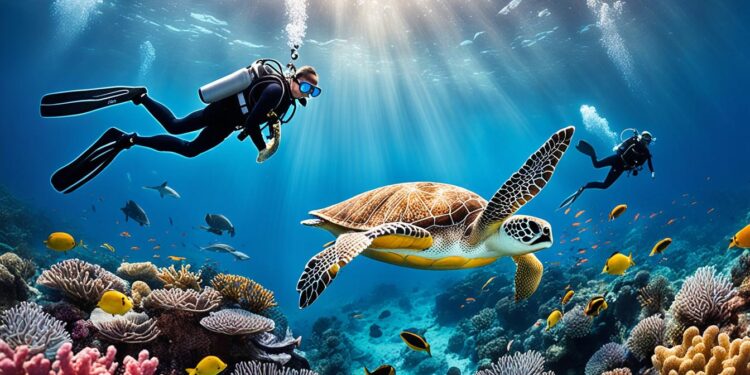Our oceans are full of amazing marine life, from colorful coral reefs to big whales and dolphins. But, these places are facing many dangers like overfishing and pollution. We must act to keep our oceans healthy.
This guide will show us how to protect our oceans and the life they hold. We’ll learn about the threats and how to fight them. By working together, we can save the ocean and its creatures.
We’ll talk about eating seafood in a way that helps the ocean and cutting down on plastic. This article will give you the info you need to help protect marine life. Let’s start this important journey to keep the ocean amazing for the future.
Understanding the Importance of Marine Ecosystems
The oceans are key to keeping our planet’s ecosystems in balance. They are full of life, known as ocean biodiversity. This life is not just important in itself but also keeps our planet healthy.
Biodiversity and Ecological Balance
Marine ecosystems are full of different plants and animals, from tiny plankton to big whales. This variety is key to keeping the oceans healthy and strong. Every species has a role in the complex web of life, helping to keep the marine environment stable.
Economic and Recreational Value
Healthy marine ecosystems also have a big economic and recreational value. They are a main source of food, supporting fishing that helps coastal communities worldwide. The beauty of the ocean draws in millions each year, creating a big ecotourism industry.
Keeping our marine ecosystems healthy is crucial for the environment, economy, and people. By understanding their value, we can work to protect and restore the oceans. This ensures a good future for marine life and people.
Threats to Marine Wildlife
The world’s oceans face many threats that harm marine ecosystems. Overfishing and unsustainable fishing are big concerns. Pollution and climate change also have a big impact.
Overfishing and Unsustainable Practices
Overfishing is a major threat to marine life. Unsustainable fishing methods, like large trawlers and gillnets, have emptied many fish populations. This harms the food chain, reduces biodiversity, and threatens coastal communities.
Destructive fishing techniques, like dynamite and cyanide fishing, damage coral reefs and marine habitats. These methods harm targeted species and affect the whole ecosystem.
Pollution and Climate Change
Pollution is a big threat to marine wildlife. Plastic waste, oil spills, and chemical runoff harm marine ecosystems. These pollutants can kill marine life, disrupt food webs, and contaminate water and sediment.
Climate change, with ocean warming, acidification, and rising sea levels, threatens marine life. These changes can destroy habitats, disrupt migration patterns, and harm sensitive species.
We need a joint effort from governments, businesses, and individuals to protect marine wildlife. Sustainable practices, conservation, and a commitment to our oceans are key. Together, we can protect marine ecosystems for the future.
Animal Conservation Efforts
Protecting our marine ecosystems and the diverse wildlife they support is crucial. There are many conservation programs and initiatives to help endangered marine species and their homes. These efforts, from government to community projects, are vital for keeping our oceans healthy.
Marine animal conservation programs are key in protecting species like sea turtles, whales, and coral reefs. They use science, restore habitats, and educate the public about marine threats. Working with local communities and pushing for policy changes is essential to save endangered marine life.
Grassroots organizations and community projects also play a big part in saving ocean life. They involve citizen science, beach cleanups, and sustainable tourism. These efforts let people help protect their local marine areas. Together, they’re making a big difference in saving our oceans.

Challenges like overfishing, pollution, and climate change make conservation more urgent. By supporting marine conservation programs and community efforts, we can all help protect our oceans. This way, we ensure our oceans and their amazing life stay safe for the future.
Sustainable Seafood Practices
We all have a big role in protecting marine life and supporting sustainable seafood. By choosing our seafood wisely, we help promote responsible fishing and encourage better seafood farming. This means picking seafood that is caught or farmed in ways that protect the ocean.
Responsible Fishing Methods
Choosing seafood caught with responsible methods is key to sustainability. This means supporting fishing that uses methods like line-and-pole fishing. These methods catch fish without harming other sea creatures or the ocean’s balance.
Also, picking seafood with a seal of approval from groups like the Marine Stewardship Council (MSC) helps. This seal means the fish or shellfish was caught or farmed in a way that cares for the ocean.
Aquaculture and Alternatives
Aquaculture, or seafood farming, can be a good choice too. Farms that do it right can help us get seafood without overfishing. Plus, trying plant-based or lab-grown seafood can add to our options for sustainable eating.
By choosing sustainable seafood, we help protect the ocean and keep seafood safe for the future. Keep up with the latest on sustainable fishing and seafood farming. Let your choices show you care about the ocean.
Reducing Plastic Pollution
The ocean faces a big threat from plastic pollution. Plastic waste harms marine life, endangers animals, and upsets the ocean’s balance. But, we can all help fight this problem and save our oceans.
Lifestyle Changes and Recycling
Starting with our daily habits can help reduce ocean pollution. By changing our ways, we can make a big difference. Use reusable water bottles, bags, and containers to avoid single-use plastics.
Make sure to recycle properly. This means recycling plastics, metals, and glass and keeping them out of our oceans. These actions help protect our oceans’ beauty and health.
We can also support efforts to reduce plastic use and push for better plastic laws. Together, we can fight the plastic crisis and keep our oceans safe for the future.
Supporting Marine Protected Areas
Marine protected areas (MPAs) are key to protecting our marine ecosystems and wildlife. They offer many benefits that go beyond their boundaries. By supporting MPAs, we help keep our ocean habitats healthy and resilient.
MPAs protect and restore marine biodiversity. They act as safe havens for many marine species. This lets them live and reproduce without human harm or overuse. This balance is crucial for the health of our oceans.
MPAs also have economic and recreational value. They draw eco-tourists and recreational users, boosting local economies. Plus, they help maintain fish populations, benefiting fishing industries.
We must support MPAs for their many benefits. We can do this by advocating for new protected areas, joining conservation efforts, and pushing for marine protection policies.
Together, we can help protect our oceans through MPAs. Their benefits reach far, making them vital for marine conservation.

Eco-Tourism and Responsible Recreation
Eco-tourism and responsible activities in oceans are key to protecting our marine ecosystems. They help spread environmental awareness and let people connect with the ocean’s beauty. These efforts are crucial for a sustainable future.
Guidelines for Sustainable Tourism
To make eco-tourism in marine areas sustainable, we must follow important guidelines. These rules help protect marine wildlife and their homes. They also reduce human impact, respect the ecosystem’s balance, and support local conservation.
Citizen Science and Community Involvement
Citizen science projects are vital for marine conservation. They get the community involved and make people feel like guardians of the ocean. By collecting data and supporting policies, people help protect marine environments. This creates a strong bond with nature and encourages eco-friendly ocean activities.
By combining eco-tourism and citizen science, we can enjoy the ocean while protecting it. These methods help us find a balance between fun and conservation. By doing so, we keep the ocean’s beauty for future generations and support marine conservation.
Advocating for Marine Conservation
Protecting our marine ecosystems is crucial. Advocacy is key to making a difference. By spreading the word about ocean issues and pushing for policies to protect marine life, we can help a lot.
Raising Awareness and Lobbying
Raising awareness is a strong way to support marine conservation. We need to teach people about the dangers to our oceans. This includes the threats from overfishing, pollution, and climate change, and how we can help.
We can use social media, events, and work with groups to spread the word. This helps more people join in and make a change.
Lobbying lawmakers is also vital. We should push for better laws, enforcement, and support for marine protected areas. This means going to town halls, writing to officials, or joining campaigns for sustainable practices and protecting marine species.
By combining awareness efforts with political action, we can build a strong movement. Every voice and action helps in the fight to save our oceans and their life.
Individual Actions to Protect Marine Life
Protecting our oceans and the amazing life in them is up to all of us. While big efforts by governments are key, we can all do our part every day. By making simple changes in our lives, we can help save our planet.
Begin by cutting down on plastic use. Say no to straws, water bottles, and disposable bags. Choose reusable items instead. Join local beach cleanups to remove trash from the coasts. Support companies that focus on being eco-friendly and ethically sourced.
Be smart about the seafood you eat. Pick options labeled Ocean Wise or Marine Stewardship Council (MSC) certified for responsibly caught seafood. Eat fewer fish that are overfished and eat more plant-based foods. These choices help support sustainable fishing and protect marine life.







